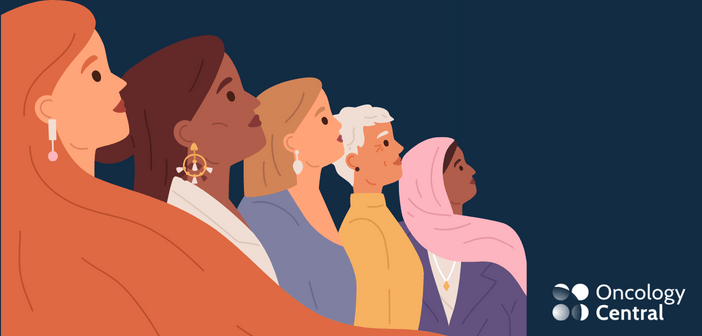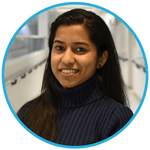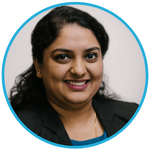Advice to my younger self with Arya Mariam Roy and Ridhima Goel

To celebrate International Women’s Day and acknowledge the often challenging career path taken by female researchers, we spoke to leaders in the field Arya Mariam Roy and Ridhima Goel to reflect on their careers so far and highlight the resources and mentors they draw upon to support their career development.
MEET THE EXPERTS

Arya Mariam Roy
MD
Roswell Park Comprehensive Cancer Center (NY, USA)
Arya Mariam Roy completed her medical school training and graduated from Government Medical College (Trivandrum, India), one of the best medical schools in India, and then moved to the United States to continue my studies and research. She then trained as a physician at the Internal Medicine (AL, USA) and undertook her internal medicine residency at the University of Arkansas for Medical Science (AR, USA). Currently Arya is a hematology and oncology fellow at the Roswell Park Comprehensive Cancer Center (NY, USA), which is the very first cancer center founded in the United States for cancer research. She is very active in research (clinical and translational) and is planning to have an academic career in oncology with a focus on clinical research. Arya is working towards becoming a Clinician Investigator.

Ridhima Goel
Chief Resident of Internal Medicine
SUNY Downstate Health Sciences University (NY, USA)
Ridhima Goel is the Chief Resident of Internal Medicine at SUNY Downstate Health Sciences University (NY, USA), where she completed her internal medicine residency after a clinical research fellowship in interventional cardiology at Mount Sinai Hospital (NY, USA). Here, she discusses her experience with mentors and as a woman in science and provides some helpful resources for a career in cardiology. Find out more in the interview below.
QUESTIONS
Talk us through a typical day for you.
Arya: My days are usually busy with a mix of academic, research and clinical practice. I attend our morning conferences, then head over to my clinic. In the clinic, I talk to cancer patients, from curable to end-of-life patients. Sometimes you will be very excited because you can talk about the newer treatments and advances in the field, but sometimes it will be emotional. You get to see happiness and excitement on the patients’ faces when you tell them that they are cured of their cancer. At the same time, it is heartbreaking to tell your patients that you do not have any other treatments to offer.
I will have research meetings with my teams, which involve my mentors, statisticians and research coordinators. During my research time, I design and write protocols for clinical trials, follow up with my clinical trial patients, complete my manuscripts and review the literature to understand the newer advancements in the field. I try to keep time for my family every day, which I think is the strength and support that keeps me going.
How have you found mentors throughout your career?
Ridhima: I have found mentors by reaching out to attendings and seniors that I worked with or whose work inspired me and asking for their advice.
Mentors have helped me get involved in different projects, broaden my career horizons and connect with other specialists within the field who can help me progress in life. They have helped me grow as a clinician-researcher and build my foundation in medicine and medical research. One important thing I have learned is that it is not important for my mentors to look like me, but it is important that their perspectives align with my career goals, and that they are willing to provide me with their time and guidance.
Arya: In India, my training and practice were mainly clinically focused. I had less time for research as the clinics and inpatient services were busy. I had mentors there who helped me excel in academia and in my professional development.
I met my first research mentor, Dr. Aju Mathew (Medical Centre; Kerela, India), while I was preparing for my higher studies in the United States. I reached out to him from India, and he helped me tremendously in my career growth. He familiarized me with the hospital system in the United States and taught me the basics of research. He is still my research mentor and is constantly helping me in my professional growth and personal development. In my opinion, a mentor should be someone who is looking out for your success, both professional and personal development.
In my residency, I met my mentors who were willing to help me grow in my career. Then, in my fellowship, I met Dr. Shipra Gandhi and other mentors at Roswell Park who always help me find opportunities for my career growth and constantly encouraged me to push myself and take up new responsibilities. We have regular meetings in which we discuss my clinical skills and knowledge and identify my weaknesses that need improving.
The person that you need for success in your professional life is a good mentor and establishing a good mentor–mentee relationship. I am a mentee and a mentor. I mentor medical students and residents for their academic success and career development. I share my research experience with them, find opportunities for them and encourage them to actively do research. Peer–mentoring is another important factor that we need to consider for a successful academic career. I mentor my peers by sharing my research experience.
My tips for a good mentor–mentee relationship
Arya: In a healthy mentor–mentee relationship, both mentor and mentee have responsibilities and duties that they should follow for the success of that relationship.
- The goals of the mentor and mentee should align and they should make an action plan together
- Make deadlines and convey that to your mentor. Write down conference dates, set up projects and meetings and get abstracts and papers ready before the deadline.
The responsibilities of mentee:
- Schedule meetings, set a timeline and respect others’ time
- Keep to deadlines
- Communicate effectively
- Be open to feedback
- Express gratitude
How do you balance work and your other passions and commitments?
Arya: Work–life balance can be hard sometimes. You need a supportive family who is understanding and constantly encouraging your success. I try to set aside time for my family every day. I might not be able to go out with them every day, but I talk to them every day and share my daily experiences, which helps me to have a constant connection. I try to spend my weekends with my family, away from clinical responsibilities, which is sometimes hard but helps to relieve my stress from work.
What resources/networks have you found useful in your career, particularly as a woman in science?
Arya:
- Facebook groups: women in medicine, oncology
- Twitter: finding professional women’s networking groups
- Networking opportunities for women at conferences: ASCO, AACR
Ridhima:
- Twitter hashtags like #WomenInMedicine and #WomenInCardiology,
- Facebook groups such as Women in Cardiology and Physician Women in Leadership.
- The American College of Cardiology Women’s Internal Medicine Cardiology program.
What are you most proud of in your career?
Ridhima: I am most proud of becoming a Chief Resident for my Internal Medicine residency program. I was selected from a highly competitive group of my co-residents and am very excited to be able to contribute to this leadership role.
Arya: I have received several national and international awards for my research such as the ASCO merit award, the AACR scholar-in-training and the Henry Christian Award from the American Federation of Medical Research (AFMR). I think I am most proud of the honors that I received while I was in medical school. It was a time when I had a family emergency, because of which I thought I might not be able to write my exams. Amidst all the difficulties, I wrote the exams and gained honors, university rank and an academic excellence award. If I had not made the decision to write the exams despite those difficulties, I would not be where I am today.
What are you most excited about in the years to come, especially around women in science?
Arya:
- Women’s equality in academics: There are still inequalities and disparities in the academic medical field. It is changing slowly over time, but we still need a drastic change.
- Leadership opportunities are needed for professional success. The mentality that women cannot be successful leaders needs to change. There are many successful women in medicine, as well as in other scientific fields. We deserve more opportunities to be a leader in the field.
- Professional success: It is always encouraging to see young women succeed in their careers. Mentorship is the most essential factor for your success. Now, I feel successful senior mentors are willing to help women scientists to grow in their careers.
- Women empowerment in all fields
Ridhima: I am very excited to participate in this year’s American College of Cardiology Women’s Internal Medicine Cardiology program – a program that promotes early career women in medicine, in an effort to diversify the cardiovascular workforce.
What are the best aspects of your job? What are the most challenging parts?
Arya:
- Best aspects: Oncology is a field that is rapidly evolving. There are new drugs, diagnostic techniques and treatment modalities emerging every day. The constantly advancing research and evidence-based medicine and the excitement of practicing precision oncology. The best part is the long-term professional relationship with your patients, something that I think is specific to oncology. Your patients will be like your family, sometimes you see them more often than your family. You share their happiness and sorrow. The best thing I have seen so far are the tears of joy from a daughter when I told her that her father was cured of cancer and would be there to walk her down the aisle at her wedding!
- Most challenging aspects: “How much more time do I have?” I get this question every single day at my clinic. It is always hard to explain, even if you know the answer. You want all your patients to be cured and have a quality of life with their families, but you need to acknowledge the fact that no matter how advanced the field is, you are helpless in some instances.
Ridhima: The best aspect of my job has always been being a part of healthcare and the ability to form close connections with my patients.
The most challenging part of my job has perhaps been explosion of misconceptions about medicine in the aftermath of the COVID-19 pandemic. It has been particularly hard combating the widespread false information and helping to restore faith in medicine and healthcare practitioners.
Are there any women in STEM that you have met in your career who you would like to mention?
Arya: The one thing that I will not compromise in my clinical practice is the care that I provide to my patients. Even if you cannot cure your patients or prolong their life, they appreciate your honesty, compassion and care. Do not make a patient who is at the end of their life wait for your time, their remaining time is precious. This is a lesson that I learned from my mentor Dr. Renuka Iyer, Professor of Medicine at Roswell Park (NY, USA). If you know that you do not have any options for them, do not make them wait in the clinic or in the hospital for hours or days with false hope. You should make it a priority to see them and be upfront and honest to enable them to make informed decisions to plan their life.
What advice would you give to your younger self?
Ridhima: The best advice I could have given to my younger self would be to not be afraid of failure. Loss of opportunities can be devastating but it has often led me to an alternative that turned out to be better for me. It is important that we must keep trying our best and not be afraid to ask for help wherever needed.
Arya:
- Explore new opportunities: There are a lot of opportunities waiting for you, but you need to come out of your comfort zone to explore and pursue them.
- Be courageous to ask for opportunities: Reach out to others who are successful in your profession and ask them for guidance.
- Be open to constructive feedback: Always ask others for feedback on your work and learn from your mistakes to avoid repeating them.
- Be confident and believe in yourself: You are the only person who knows your strengths and weaknesses very well. Identify your weaknesses and constantly work to rectify them. Your mentors can guide you toward your success, but it is your hard work, knowledge and courage that help you to stand out among your peers.